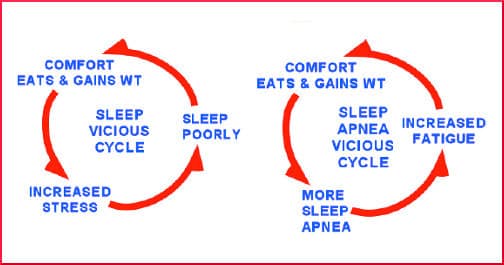
Obesity has long been acknowledged as a multi-factorial problem, and a good case has been made that corrupted sleep is indeed one of those factors. Childhood Obesity News has discussed the supreme importance of quality sleep. In his book Overweight: What Kids Say, Dr. Pretlow spells out the ties between various physical and mental conditions:
Insufficient or poor sleep causes fatigue, stress, and inability to handle stress. This may result in comfort/stress eating, more weight gain, more stress, which then further impairs the ability to sleep, and so on.
Subtle yet important clues can sneak up, which make it so important that healthcare providers obtain complete histories, along with vital signs, BMI, and other physical metrics. In Addiction Model Intervention for Obesity in Young People, Dr. Pretlow and Carol M. Stock wrote:
Night snacking or night bingeing usually results from feeling lonely or stressed from the day or not being able to sleep.
If stress is a factor, as it so often and obviously is, stress management is of primary importance. Another vicious cycle occurs around sleep apnea. Dr. Pretlow says:
Sleep apnea (pauses in breathing during sleep) is associated with obesity in kids. These disruptions in breathing result in poor sleep and fatigue. Fatigue from sleep apnea might bring about comfort/stress eating, with more weight gain, more sleep apnea, more fatigue, more comfort/stress eating, etc.
Insufficient sleep undoubtedly affects the desire and ability to be physically active, and of course a lack of physical activity is an invitation to weight gain. But there is more going on than the burning of calories. Exercise helps sleep patterns to regularize, which is always a plus.
A snooze on the wild side
One interesting thing about cycles is that they do not inevitably spiral out of control and into “rock bottom” status. No, an unhealthy sleep cycle can simply drag on and on for years at the same level, sapping a small but vital amount of aliveness each and every day.
But when a vicious cycle does get severely out of control, a child might do bizarre things, like purposely stay awake in order to sneak food during the night. A lot of parents don’t realize that their kids are staying up late to play games or catch up on social media, or even awaken periodically throughout the night to engage with some type electronic device with a glowing screen.
Dr. Pretlow offers some hints to avoid night-time snack attacks, and leaving the screens alone before bedtime is one of them. This is unlikely to happen, especially since entertainment devices are no longer family-centric and everybody has their own.
But it is a good idea. And so is this one:
The American Academy of Pediatrics recommends that parents limit their child’s screen time to 2 hours per day, and encourages alternate activities such as outdoor play or sports, reading, socializing with peers, or hands-on creative activities such as crafts or playing an instrument — time that could easily be replaced with outdoor play, sports, and interpersonal activities.
The sad thing is, “easily” is not the appropriate word here. If it were that easy, no action on the part of parents or authorities would be called for. If it were that easy, kids would already be doing those things without encouragement.
Dr. Pretlow also suggests that a person tweak the schedule and brush the teeth immediately after dinner. Here is the logic. Toothbrushing, of course, should be done before sleep, so that food residue and harmful bacteria are not just left alone together to party all night long. Most people do it just before bedtime. By switching to after-dinner brushing, a person — especially a dentally conscientious, yet lazy, person — might shun evening snacks because it’s too much of a hassle to get out the toothbrush again.
Your responses and feedback are welcome!
Source: “An Overlooked Factor in the Childhood Obesity Epidemic,” PsychologyToday.com, 12/23/13
Photo credit: Overweight: What Kids Say

 FAQs and Media Requests:
FAQs and Media Requests: 











